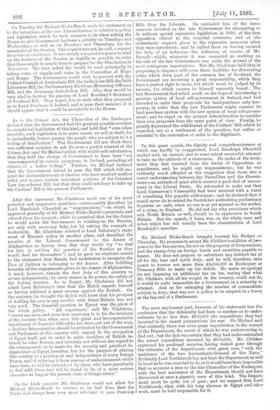After this statement Mr. Gladstone made one of his most
powerful and impressive speeches,—subsequently described by Lord Randolph Churchill as "magnanimous,"—in which he approved generally of Sir Michael Hicks-Beach's proposals, and offered them his support; while he promised that for the future he would assist the Government in winding-up the Session, not only with necessary help, but by setting the example of taciturnity. Mr. Gladstone referred to Lord Salisbury's state- ment of Russian policy in another place, and described the promise of the Liberal Government to the Ameer of Afghanistan as having been that they would try "to deal for him in settling the question of the frontier as they would deal for themselves "; and he gave an emphatic assent to the statement that Russia had undertaken to recognise the Pass of Zulficar as belonging to the Ameer. After fulfilling honestly all the engagements given to the Ameer of Afghanistan, it must, however, remain the first duty of this country to secure independently, by every means in its power, the safety of the Indian frontier. As to Egypt, Mr. Gladstone did not admit Lord Salisbury's view that the Mahdi regards himself as having achieved a great success against the British. On the contrary, he thought the Mahdi well knew that his prospect of holding his own in any conflict with Great Britain was not very good. The financial question in Egypt was the pivot of the whole policy. "All experience," said Mr. Gladstone, "shows me more and more how necessary it is for the interests of the country that, when once this great and insurmountable impediment of financial difficulties has been put out of the way, a decisive determination should be arrived at by the Government and Parliament of this country with respect to the occupation of Egypt itself, not in order to make sacrifices of British in- terests to other Powers, and certainly not without due regard to the arrangements to be made for the security and practical in- dependence of Egypt hereafter, but for the purpose of placing this country in a position of real independence of every foreign Power, and of relieving it from sources of embarrassment which have been, as will be understood by those who have practically to deal with them, and will be found to be, of a most serious character as long as the present state of things exists."


































 Previous page
Previous page